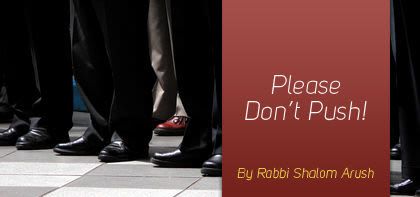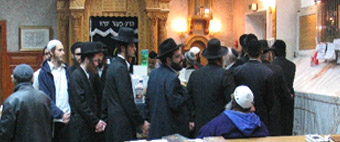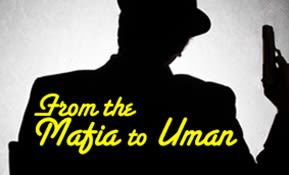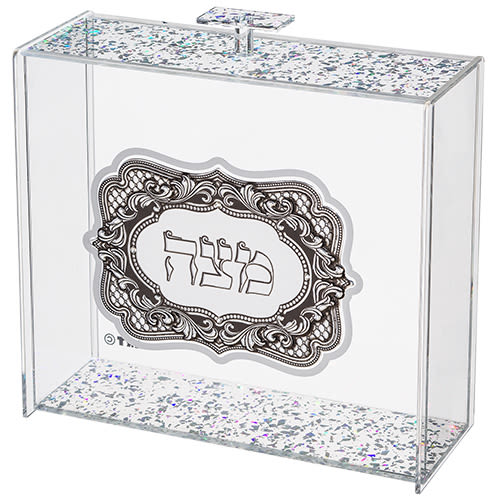
Please Don’t Push!
It’s up to us to sanctify Hashem’s name by being examples of upright character. People should marvel at how Breslever Chassidim are so well-mannered...

Translated by Rabbi Lazer Brody
Rebbe Nachman of Breslev once said that the great kings and statesmen of the world would be well-advised to send him their children so that they could learn proper manners and deportment, what we call derech eretz. Breslev of old was always known for good manners, courtesy, and refined behavior. Rebbe Nachman demanded that his students and followers be human beings, not beasts on two legs.
Our sages teach us that derech eretz is a prerequisite to Torah. Torah is like a fine wine. Good character and proper manners are like a clean crystal goblet, a worthy receptacle for the wine. But, if a person is rude and impolite and his character is tainted with bad traits, then teaching him Torah is like pouring fine wine into a filthy glass. Who would want to drink it?
It hurts me to see the chutzpa, the utter insolence of the wild people that get on the plane to Uman and disregard the directives of the stewards and stewardesses. Not only is that not Breslev, but it’s a total desecration of Hashem’s Name, Heaven forbid.

We come to Uman to refine ourselves, to strengthen emuna and our awe of Hashem. One can’t get closer to Hashem by shoving someone else. Pushing, shoving, or trampling another person in order to get closer to Rebbe Nachman’s grave site is the most inane thing imaginable. How do people expect to get close to the tzaddik by acting in a way that the tzaddik considers despicable? A person is much better off simply standing within sight of the holy grave site, making sure that he doesn’t sadden or disturb any other person.
Rebbe Nachman once sat at the head of his holy Shabbat table on Friday night. Tens of his followers flocked around the table. Rebbe Nachman tasted a tiny morsel of fish and then extended the plate to his followers so they could partake of the shirayim, the tzaddik’s holy leftovers, renowned for their amazing spiritual benefits. The Chassidim pounced on the plate like hungry vultures, elbowing and shoving one another crassly. A grin of irony reflected from Rebbe Nachman’s lips. “I see that Mashiach has finally come,” he said.
Bewildered, the Chassidim looked at one another; nobody understood what the Rebbe meant.
Reading their minds, Rebbe Nachman continued: “The crassest nations from the far corners of the earth are now gracing my table!”
Utterly embarrassed, the Chassidim looked at one another sheepishly, withdrew their hands from the fish plate, and sat down quietly in their seats.
In Rebbe Nachman’s presence as well as in Rebbe Natan’s, there was no pushing or shoving. Our Rebbe wouldn’t tolerate seeing one person cause the slightest pain or anguish to someone else. A person whose ego is fueled by seeing others push and shove to get close to him can’t possibly be a true tzaddik.
We cannot fathom the punishment for causing pain and anguish to a fellow human. People have difficulties in life because they’ve caused pain to others in the past, yet have never made amends. Piyus – apologizing to and mollifying another person – is the same as teshuva to Hashem. If a person transgresses against Hashem, he must do teshuva. But, if he has “transgressed” against a fellow human – which is also a transgression against Hashem and His Torah – he must ask forgiveness from the damaged individual. Many health and income problems, particularly difficulties in finding a soul mate or in having children, can be traced to an affront or insult that has never been rectified by a sincere apology and request for forgiveness.
If verbal insults invoke harsh penalties and stern judgments, then you can’t imagine how serious it is to lift a hand against another person. Insults and hitting have no place in the home or in educating children. If a parent wants his children to stop fighting with each other, then he should be sure that never raises his voice in anger, much less raise a hand. Education begins with parental example. Being a parent doesn’t give the right to strike another human being – don’t forget that your children are human beings too.
Any person who thinks that aggressive behavior can coexist with teshuva and Torah is living in a fantasy. Aggressive behavior or any type of violence – verbal or otherwise – has no place in a Jewish home. If you want to be connected to Hashem, then don’t cause pain to other people, especially to your spouse and children.
It’s up to us to sanctify Hashem’s name by being examples of upright character. People should marvel at how Breslever Chassidim are so well-mannered. This is a sanctification of Hashem’s Holy Name and a credit to the memory of our holy Rebbe Nachman who implored us, “Please, don’t shove.”










12/08/2015
Thank you for this article!
Ever since last Lag B'Omer, when Chassidic men were pushing each other and even women (at the women's entrance) to get on the bus to Meron, this issue has troubled me. It's ok if you don't want to publish this comment, just thank you very much for writing this article, and I hope it reaches the people who need to read it.
12/08/2015
Ever since last Lag B'Omer, when Chassidic men were pushing each other and even women (at the women's entrance) to get on the bus to Meron, this issue has troubled me. It's ok if you don't want to publish this comment, just thank you very much for writing this article, and I hope it reaches the people who need to read it.
11/22/2011
Is hitting really worse than verbal aggression? Physical wounds heal in a relatively short time. Emotional wounds may never heal…